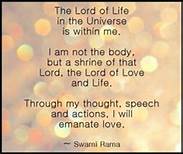 “The Soul does not love; It is Love itself.” – Yoga Sutras of Patanjali.
“The Soul does not love; It is Love itself.” – Yoga Sutras of Patanjali.
The Vedas (knowledge) are ancient Sanskrit texts written some 3 to 5,000 years ago, their essence is Vedanta (end of knowledge), the central theme of which is unity or oneness (Advaita – non-dual). The differences that we experience in usual consciousness are relative, a matter of degree and not kind. From the absolute perspective there is only unity and everything is a manifestation of Love, from the lowest creature to the highest man. How can Brahman (the ultimate reality underlying all phenomena) be partial, if it pervades everything, it does not favour one against another for that would imply that the Love is conditional.
Vedanta tells us we should not dwell on our weaknesses or condemn ourselves as miserable sinners. Yes, we make mistakes but never mind as long as we recognise them and learn. We should not constrict ourselves, we should grow and be expansive and realise our true nature. The ‘Self’ is pure, perfect and omniscient; it was never born and will never die. Behind the ‘mortal coil’ of the body-mind complex is an infinite ocean of purity, freedom, love and power. Our thoughts and actions should be such as to make for oneness, for harmony and not for separations and disharmony.
A theme of Vedanta is to see God in everything, but not as a concept or image. If we cannot see God in ourselves and in every living being then where shall we go to find God? This same ‘Self’ that is in the sun, the moon, the trees, the animals, fire and water is also in us. But everything that has name and form is transient; the universe is in a constant state of flux; that which is unchanging appears to be changing. What need is there of temples and deities if God is everywhere and can be worshipped anywhere?
The greatest temple is the human body. We should honour and respect all forms of life as manifestations of the one Life and Love; this is worship in its truest sense.
We are embodiments of Love for that is the very nature of Brahman. To love yourself (not in vanity) is to love all, to hurt another is to hurt your-Self. Love, truth, and knowledge are within us, they are our birthright, we only have to manifest them and make them tangible.
Humankind should rise up to the ideal, not try to reduce the ideal to the level of the flesh. We should affirm to ourselves that we are good, that we are divine, not make excuses for weakness and dwell on mistakes with feelings of guilt. How can the cosmic spirit flow through us, how can we manifest the fullness of life, love and light if we reduce ourselves by pettiness, fear and guilt? We should make the effort to unify ourselves with Brahman, that which we already are, this is said to be the very purpose of our existence. – P. 110, Yoga: A Path of Self_Discovery
Leave a Reply